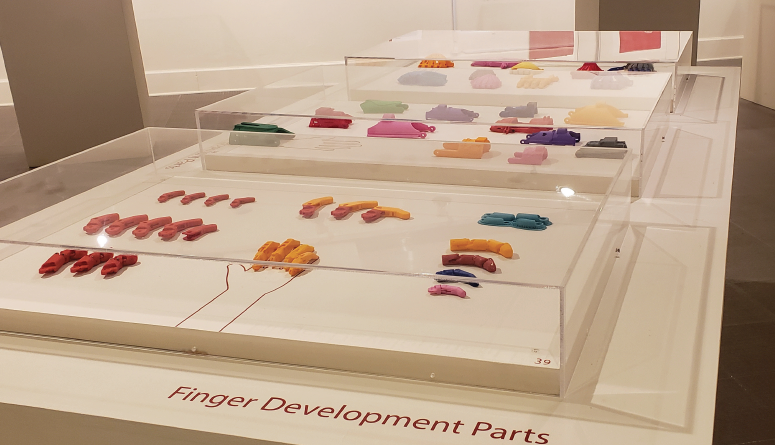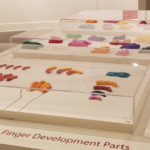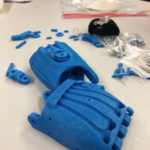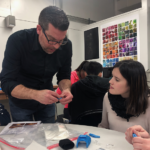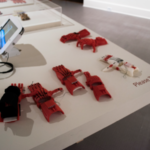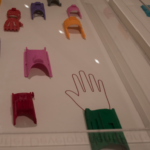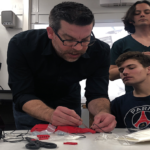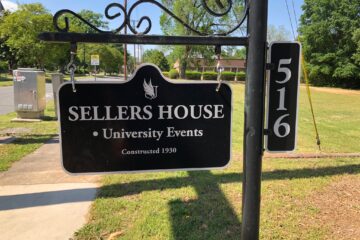The exhibition “Bespoke Objects” has been on display in the Elizabeth Dunlap Patrick since last December. It shows the work of Frankie Flood, a professor at Appalachian State University, and focuses on his recent endeavour into 3D printed prosthetics. He came by Winthrop’s campus on Feb. 28 to share his work with students and the community.
One of the workshops Flood held was to teach students and professors in attendance how to assemble one of his printed prosthetic hands. The model used is called the raptor hand. It is almost entirely created from 3D printed plastic , save for a few metal screws and elastic string. It works so that when the wearer bends their wrist forward the fingers come together in a fist allowing for grip. They can be sized to fit any hand and cost less than $20 in total.
“They’re not prosthetics in the traditional sense but they change the mindset from the original thing,” Flood said.
Rachel Smith and Karsyn Rape were two sophomore biology majors at the workshop.
“3D printing is on the rise, and I havent had any experience with it yet, I’ve only seen videos,” Smith said. “I thought this would just be really cool to see how a machine can build a working thing.”
The workshop was held in Winthrop’s creator space which houses its own 3D printer. Flood instructed the students step by step on how to construct the hand.
“It was really easy, he was really knowledgeable, and I knew exactly what to do with him explaining it,” Rape said.
After dealing first hand with the vast potential of new technologies, the impact was not lost on those in attendance.
“It a thing i never really thought could be made when we were kids,” Smith said. “I mean imagine a kid geting a blue arm, they would be in awe. I would have loved to have a blue arm as a kid.”
“I want a blue arm now!” Rape said.
Flood’s father was a factory worker who passed on the value of craftsmanship. He and Flood would spend hours in their personal workshop creating together. This is where Flood developed an early affinity for metalwork and crafting.
“Being able to hang out with my dad and watch him work on things in his spare time in the garage has probably had the biggest impact on my career,” Flood said.
As Flood went on to study art in college and work in a factory himself, where he began to value functionality in art. He began creating jewelry, each with their own functions, and even a line of pizza cutters made from and inspired by motorcycle parts. The uniqueness of these works came as a response to the “sterile conformity of mass produced objects.”
“A lot of industrial designers made things that looked cool but didn’t know how they worked,” Flood said.
This led Flood down a path of exploring new technologies and processes he could use to create art. He began looking into how design could be used to solve other disciplines’ problems which eventually lead to creating the raptor hand. Flood has taken this design process to many universities and conferences all over the country explaining how to assemble one. Beyond that, his design has gained international traction online and provided accessible prosthetics to children all over the world.
“I’m in a privileged place of being a professor where I don’t have to worry about money,” Flood said. “A lot of the projects I’ve shown tonight, they come out of an honest place within me. The motivation to do them is not for recognition or for money. There’s a purity to it, and that may be my own utopian purity. I don’t know if I would be making the work I was making if it was for money.”
Flood now focuses his work on how crafting can serve local and global communities. He finds this work has helped him regain his power as a maker and hopes to impart that knowledge on any possible students.
“When I have an idea I can make anything I want without limitations. I think that’s what we need in the world,” Flood said. “We’ve got some big heavy problems and if we can take the attitude from complaining about it on our social media and saying like ‘I’m going to try to be an agent of change,’ that’s what I mean by empowerment.”
Flood’s work will be on display in the galleries until March 8. More of his work can be seen on Frankieflood.com. He will also be teaching a summer workshop that is open to the public in his own studio in Boone, NC-more information can be found on his website.

